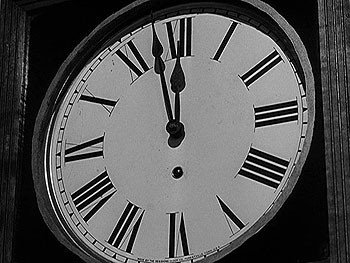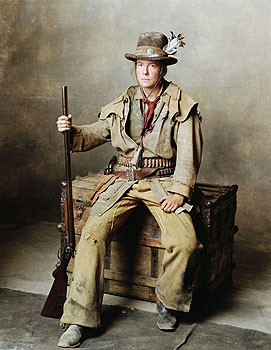“Welcome To Fucking Deadwood.”
Published on July 30th, 2011 in: Issues, My Dream Is On The Screen, TV |By Paul Casey
Deadwood ran for three seasons on HBO before it was cancelled. It did not have the longevity or the success of The Sopranos or The Wire, yet its vision of the Modern Western stays with us, and reminds us of the potential of the television series to surpass even the greatest cinematic efforts.
The journey of the Western is a long and strange one, and Deadwood stands as the end result of decades of progression from the seemingly superficial adventure picture to a genre which can deal with the darkest themes and stories. I believe it to be the greatest Western of its kind.

High Noon, 1952
Fred Zinnemann’s 1952 film High Noon has a considerable hold over any Western which refuses to simplify, locking onto the moral and political issues which the time period and genre present to us. Gary Cooper’s well meaning Marshall, Will Kane, who fears that he will fail the courage test when the moment comes, and the unflattering, but truthful portrait of the fine line between courage and cowardice, are similar to the fractured people who occupy Deadwood.
The political climate at the time of the production of High Noon was one of blacklisting and red-baiting. Writer and producer of the film, Carl Foreman, was eventually blacklisted because of his unwillingness to “name names” when called before the House Un-American Activities Committee (HUAC). But High Noon was not simply an allegory for the issues facing those who refused to fall in line in Hollywood.
Yes, it exposed the fear of otherwise good people to stand up for what is right when it is hardest. It was also though, a display of what the Western was capable of portraying beyond the John Wayne model. Wayne called the movie “the most un-American thing” he had ever seen. One shudders at what “The Duke” would think of Deadwood. If the Western hero served as a stand-in for American justice, then High Noon suggests that things are not so clear cut, that even that when one wishes to do right, he can still find himself doing wrong.
Deadwood‘s vision of America and justice is in much the same spirit. It depicts courage as a fickle attribute, something that comes and goes depending on circumstance. High Noon shows us that the hero is fallible, and in its closing moments, that bravery can come from unexpected places. If one thinks hard enough, it is always possible to think of a reason not to stand up for what is right. The inability of a town to stand up for the will of law and a hero who doesn’t want to stand up for what is right but must, are ideas which Deadwood further explores.

Robin Weigert as Calamity Jane
Perhaps the greatest example of this is the simultaneously beguiling, hilarious, and heartbreaking performance of Robin Weigert as Calamity Jane. Weigert plays Jane as a champion drunk, fuck-coarse and coated in filth. She possesses a kind heart, and is someone who tries her hardest to stand up to bullies, even while she fears for her life.
The scenes in “Deep Water” which see Sofia—the orphaned daughter of the Metz family, killed by Al Swearengen’s goons—protected by Jane and Dr. Cochran are some of the strongest early moments in Deadwood. Cochran, played expertly by Brad Dourif, is another man, among many, trying to quiet his fears and be better than the camp will allow.
The iconic shot of Marshall Will Kane throwing his badge on the ground at the end of High Noon showed the disparity between personal commitment to justice and the shifting standards of the public. Kane was not just fighting for himself or the town, but for what the badge represented.
The opening minutes of the first episode of Deadwood echo this, with Seth Bullock—here, the closest thing to a straight hero—refusing to give in to mob rule and carrying out the letter of the law, whether the people like it or not. [Please note: The sound quality is poor in this clip.—Ed.] In his jail he holds a man sentenced to death. The enraged mob wish to inflict their own brand of justice on him. Bullock refuses. Even though this man will die either way, and even though his own life could be at risk as a result, he believes that upholding the law is more important. He does not sway, even while he may want to.
Time limit is exhausted. Please reload the CAPTCHA.